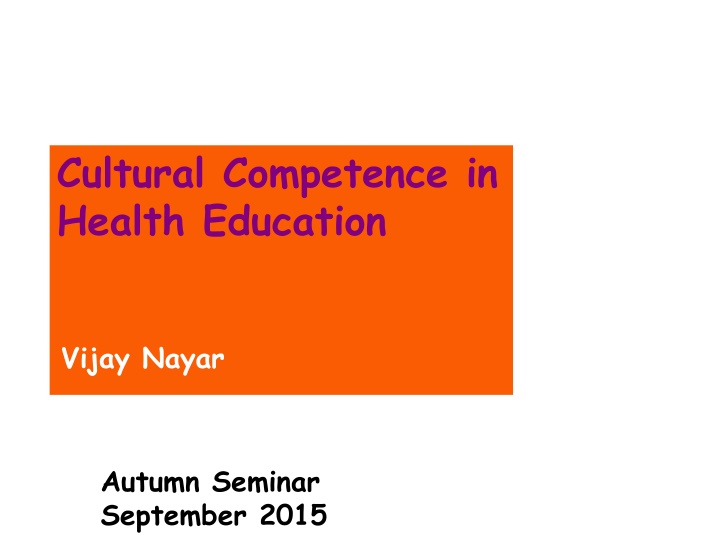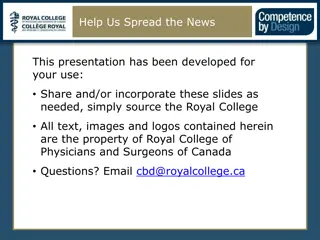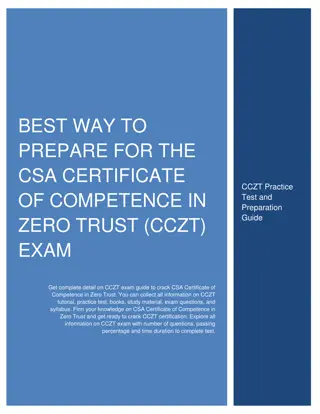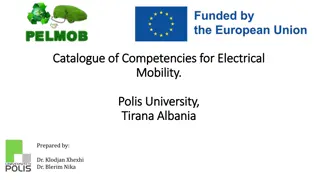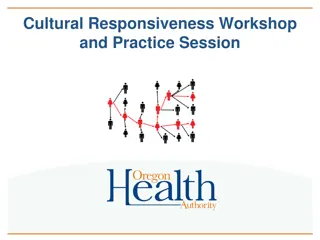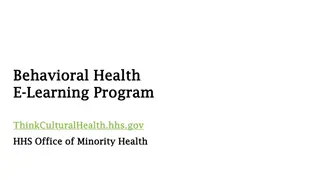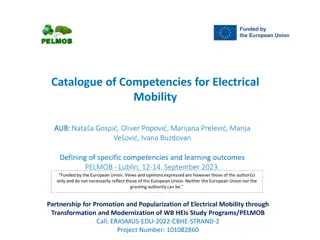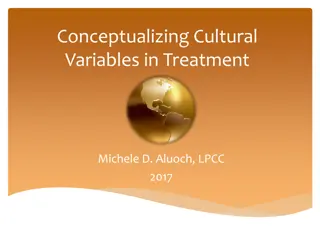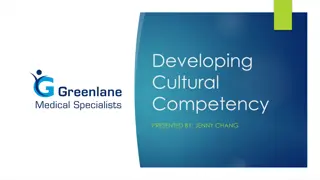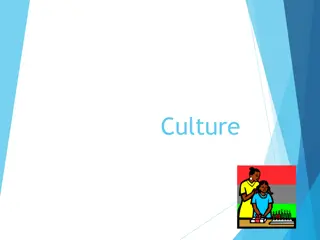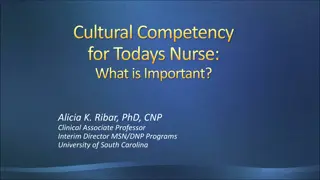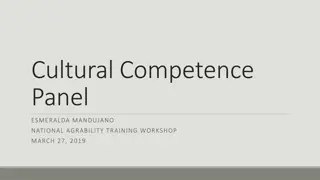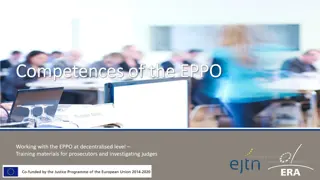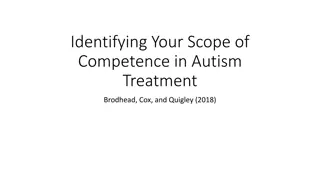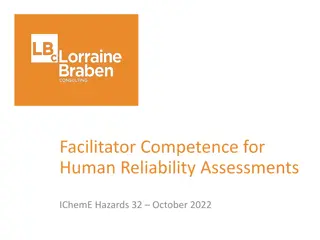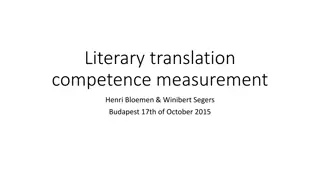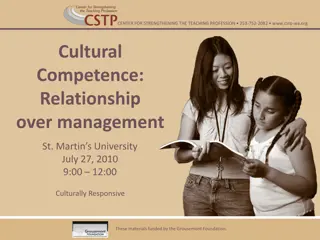Cultural Competence in Health Education
This seminar delves into the importance of cultural competence in health education, focusing on promoting equality and valuing diversity in clinical care. Topics include cross-cultural clinical skills, addressing health inequalities, and understanding the impact of culture on healthcare practices. The session highlights the need to increase awareness of diversity in population demographics and workforce, essential for providing inclusive and effective healthcare services.
Download Presentation

Please find below an Image/Link to download the presentation.
The content on the website is provided AS IS for your information and personal use only. It may not be sold, licensed, or shared on other websites without obtaining consent from the author.If you encounter any issues during the download, it is possible that the publisher has removed the file from their server.
You are allowed to download the files provided on this website for personal or commercial use, subject to the condition that they are used lawfully. All files are the property of their respective owners.
The content on the website is provided AS IS for your information and personal use only. It may not be sold, licensed, or shared on other websites without obtaining consent from the author.
E N D
Presentation Transcript
Cultural Competence in Health Education Vijay Nayar Autumn Seminar September 2015
Why are we doing this? Increasing diversity of: Population Workforce Trainees Legislative frameworks - Equality Act (2010)
East of England Population of 5.8 million people Higher than average proportion of people aged over 65 yrs Approximately 400,000 people from non- white backgrounds Highest concentration of Gypsies and Travellers in its population compared to the rest of England.
Why are we doing this? Promoting Equality and Valuing Diversity is a section of the GP curriculum Part of the Foundation curricula Part of many other specialties curricula
Why are we doing this? Relevant to clinical care Relationships with patients Working with colleagues Helps to reduce Health Inequalities
Cultural competence Equality and Diversity, Culture, Race, Ethnicity Health inequalities and literacy Epidemiology of population health in different cultures Healing traditions and beliefs
Cultural competence Cross-Cultural Clinical Skills, language barriers, using interpreters Self-awareness of own culture, assumptions, stereotypes, biases and their impact Impact of culture on learning and teaching
Health inequalities and literacy Epidemiology of population health in different cultures
Health Literacy A person with adequate health literacy is someone with reasoning and language knowledge for accessing, understanding and applying information for healthy living and keeping medically fit. (WHO, 1998) the perception,
Individual Poor Health Outcomes Poor Health Literacy Organisational Professional
Health Illiteracy mainly older educated to lower standards in low paid employment lower socioeconomic influence mostly of ethnic minorities those with disabilities poorer knowledge about health acquire poor preventive care poorer CDM poorer mental health attend A/E more often admitted into hospital more frequently
Individual Poor Health Outcomes Poor Health Literacy Organisational Professional Cultural Competence
Equality Ethnicity Diversity Culture Race
Diversity The recognition and valuing of difference between people
Dimensions of diversity, some more visible than others Gender Age Ethnicity Nationality Language Skin colour Religion Disability Class (wealth, education) Occupation Sexual orientation Political orientation Culture (beliefs, expectations, behaviour)
Equality Is about creating a fairer society in which everyone has the opportunity to fulfil their potential
Equality Act (2010)- Prohibited Conduct 1. Direct discrimination, including by association and perception 2. Indirect discrimination now covers all characteristics 3. Harassment 4. Third party harassment 5. Victimisation Duty to make reasonable adjustments
Diversity and Equal Opportunities Not about treating everyone the same More about providing a LEVEL PLAYING FIELD Equal access to opportunities
Defining terms... Race Ethnicity Culture
Race A socially defined population that is derived from distinguishable characteristics that are genetically transmitted eg skin colour, facial features, hair texture
Ethnicity The belonging to a social group often linked by race, nationality, religion and language often with a common cultural heritage.
Race Culture Religion Ethnicity Language Nationality Country of origin
Culture Shared beliefs, values and attitudes that guide the behaviour of group members
Culture Shared beliefs, values and attitudes that guide behaviour of members Complex social phenomenon, multi- dimensional Dynamic concept - keeps changing We are all multicultural but selective
Create working culture that recognise, respect, value and harness difference Cultural Competence Ability to respond to their healthcare needs Ability to interact with different cultures Recognition and valuing of difference between people
Communication Assessment Care provision Self awareness Culture biases Different cultures Knowledge Skills Attitudes Valuing diversity Respecting individuality
Cross-Cultural clinical skills, language barriers, using interpreters
Barriers to communication Language Accent Nonverbal cues misinterpreted Cultural assumptions and stereotypes Preconceptions Attitude towards another culture Ethnocentricity Unconscious bias
Barriers to communication Lack of knowledge of healthcare system Differences in health seeking behaviour Doctor-patient roles unclear: doctor centred patients told what to do and they accept this not used to being asked about their I, C, E Not used to shared management plan May be normal for children of elderly folk to be part of decision making
Consequences of poor communication May make people appear awkward or difficult Lack of English can make someone appear less intelligent, or lack sense of humour Misinterpretation I don t know how to help this person Heartsink patient
Overcoming barriers Building relationship Assessing patient s problems Managing patient s problems
Cultural knowledge about... Family life Attitude to illness Death and bereavement Sexual issues Dietary restrictions, alcohol Childbirth, circumcision
Impact of culture on learning and teaching
Influence of Culture on Learning and Performance Overseas Trainees confronted by a: new culture different educational system different learning and teaching styles
Culture is not an excuse for poor performance but may put it into context
Power distance In some cultures quite large power distance teacher to student, led by teacher, not contradicted or criticised In others - increasingly more self directed, encouraging to challenge knowledge Potential implications no experience of challenging or debate therefore unable to unpack the knowledge, difficulty with SDL
Individualism vs. Collectivism Think of themselves as an individual with a focus on I Learn to intuitively think of themselves as part of a group/family focusing on we Individual excellence is nourished and celebrated Unquestioning loyalty is expected and assumed
Potential implications Exams are focussed on evidence of knowledge and recall vs knowledge applied to practice requiring demonstration of critical reasoning Need to maintain face , do not like I don t know see it as a threat Difficulty managing uncertainty
Useful interventions Induction and preparatory work Discuss their approaches to learning Supervision and Support Mentorship Feedback on performance-good and bad Correct performance problems as they occur Encourage resilience
Implications for Educators Be aware of your own cultural assumptions and biases Appreciate the extent to which difficulties that arise are due to cultural factors Reality shock and need to deal with unmet expectations Induction not only policies and procedures but also cultural induction
Cultural Induction Raise awareness of culture its effects on learning its effect on performance Discuss models of learning Requirements of exams Educational contract this is not prejudice
Cultural Induction Help their frustration and other emotions Fear of failure/criticism Self Directed Learning Reflective practice Managing uncertainty Encourage resilience
Communication skills: Deconstruct language Problem solving skills Overcoming artificiality and being formulaic Interpersonal skills Verbal and non-verbal cues Subtleties and nuances of language Doctor-Patient relationship
Professionalism GMC Confidentiality Leadership and Teamworking Feedback on performance-good and bad Correct performance problems as they occur Role modelling and Reflective practice
Cultural Competence It s always OK to ask Keep questioning your assumptions Remember culture is complex and multidimensional culture is dynamic, not static most people are a mixture of cultures
